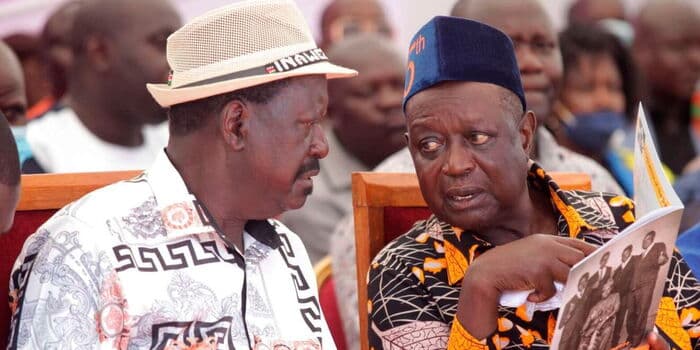We're loading the full news article for you. This includes the article content, images, author information, and related articles.
ODM's interim leader has drawn a new line in the sand for the 2027 general election, declaring the party will not accept any position lower than the deputy presidency in any future coalition, a move that significantly raises the stakes for President William Ruto and the opposition.

NAIROBI - The Orange Democratic Movement (ODM) will not settle for any position less than the Deputy President's seat in any political alliance for the 2027 general election, interim party leader Dr. Oburu Oginga has declared. In an exclusive interview with NTV and the Daily Nation on Thursday, October 30, 2025, the Siaya Senator fired the opening salvo in the burgeoning 2027 succession race, fundamentally altering the political calculus for potential allies and rivals. [3]
“If we have to go for a lower position, it must not be lower than number two (deputy president) in any formation. That is my take. We should not take less than that,” Dr. Oginga stated emphatically. [3, 9] This declaration serves as a stern message that ODM, a political heavyweight, intends to leverage its significant national support base to secure a top-tier role in the next government and will not return to the opposition benches. [3, 10]
Dr. Oginga's remarks come at a critical juncture for ODM, which is navigating its political future following the recent death of its founder and long-time leader, Raila Odinga. [1, 13] The party is currently engaged in a cooperation agreement with President William Ruto's United Democratic Alliance (UDA), described as a “broad-based government.” This partnership is formally guided by a 10-point Memorandum of Understanding (MOU) signed on March 8, 2025, which focuses on implementing people-centric issues, including the National Dialogue Committee (NADCO) report. [3]
However, senior ODM officials, including Dr. Oginga, have been keen to clarify that this arrangement is not a pre-election coalition for 2027. [3, 4] “This participation does not talk about 2027. It is about implementing people-oriented issues. Once those are fully implemented, 2027 will take care of itself,” Dr. Oginga explained, adding that ODM remains free to explore other alliances depending on the faithful implementation of the current agreement. [3, 14]
This position has been echoed by other party leaders. ODM Secretary General Edwin Sifuna has consistently maintained that the party has not adopted an official resolution on its 2027 plans. [3, 7] Dr. Oginga supported this, stating, “Sifuna was within his rights to say the party has not made a position about 2027. That is the current position on the matter.” [3] This underscores a strategy of cooperation for governance while keeping electoral options open.
The firm stance on the deputy presidency appears to be a strategic move to unify a party grappling with divergent views on its future direction. [24] A faction within ODM, including some officials serving in the current administration, has been vocal in its support for President Ruto's re-election. [3, 19] In contrast, another camp, championed by figures like Sifuna and Kisumu Governor Anyang' Nyong'o, insists that ODM must field its own presidential candidate. [7, 8]
Dr. Oginga's declaration sets a high and clear benchmark for any negotiation, effectively managing internal expectations. He stressed the immediate priority is to strengthen the party from the grassroots up. “Nobody will respect you or negotiate with you if you are a weak party. Our emphasis is on strengthening our party, ODM, so that we can negotiate for the top position in the land,” he said. [9]
Appointed as acting leader in October 2025, Dr. Oginga, the elder brother of Raila Odinga, is widely seen as a stabilizing force tasked with steering the party through its transition. [11, 20] His leadership is viewed as one of continuity, safeguarding both his brother's legacy and the delicate cooperation with the government. [11, 13]
The demand for the deputy president slot has significant implications for Kenya's political landscape. For President Ruto's Kenya Kwanza alliance, it complicates any potential formal coalition with ODM, as it directly challenges the position of the current Deputy President, Prof. Kithure Kindiki. [3] It forces the ruling coalition to weigh the electoral benefits of an ODM alliance against the potential internal disruption.
For the United Opposition, which is reportedly formulating its own power-sharing agreement, ODM's high asking price signals that the party will be a formidable and demanding partner in any anti-Ruto coalition. [3, 24] The move positions ODM as a pivotal player whose allegiance could determine the outcome of the 2027 election.
As the nation inches closer to the next electoral cycle, Dr. Oginga's bombshell ensures that ODM, even in its post-Raila era, remains a central force in shaping Kenya's political destiny. The party's focus now turns to internal consolidation and preparing for high-stakes negotiations where, it has now been made clear, the second-highest office in the land is the minimum acceptable prize. [9, 17]
Keep the conversation in one place—threads here stay linked to the story and in the forums.
Sign in to start a discussion
Start a conversation about this story and keep it linked here.
Other hot threads
E-sports and Gaming Community in Kenya
Active 9 months ago
The Role of Technology in Modern Agriculture (AgriTech)
Active 9 months ago
Popular Recreational Activities Across Counties
Active 9 months ago
Investing in Youth Sports Development Programs
Active 9 months ago
Key figures and persons of interest featured in this article